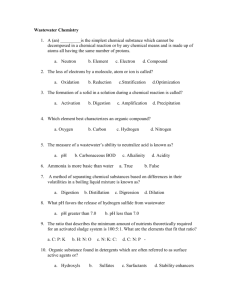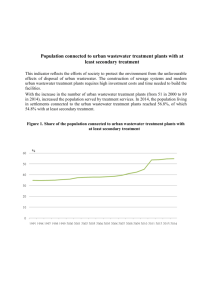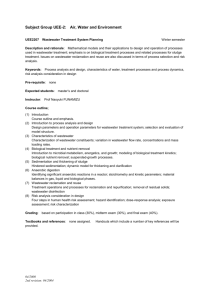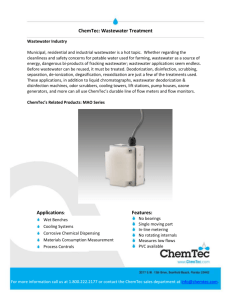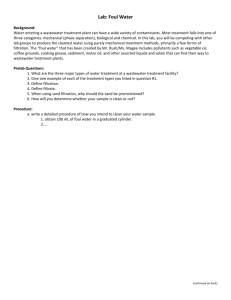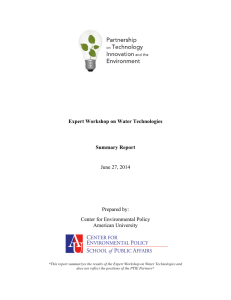Examples of R&D Projects
advertisement
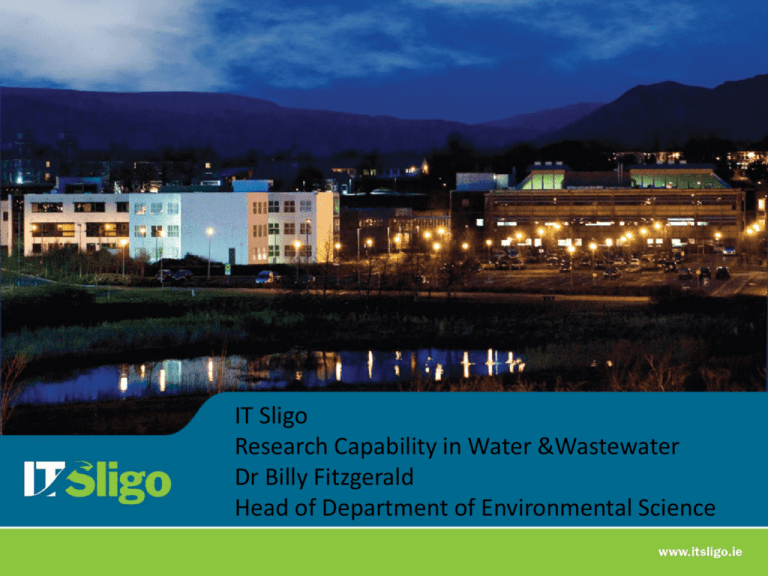
IT Sligo Research Capability in Water &Wastewater Dr Billy Fitzgerald Head of Department of Environmental Science Brief Background • 40 years experience in the area of Environmental Science/Management and Environmental Engineering • Significant success with Open & Distance Learning (ODL) and on-line courses • Courses available from Levels 6 - 10 • Principal Investigators in this Strategic Research Centre are Interdisciplinary • CERIS is internationally engaged in water and wastewater research through collaboration with industries, agencies and other academic institutions €1.54 M in research funding Thematic Areas Applied Ecology Resource Management • Agroecology • Ecosystem Management and Restoration • Ecosystem Services • Invasive Species • Molecular Ecology • Water and Wastewater Management • Energy Management • Bioremediation of soils • Nutrient Management • Sustainability systems R&D Collaborations to date • • • • • • • EPA Inland Fisheries Ireland Teagasc Bord na Mona Northern Ireland Water Local Authorities Numerous Industrial Sectors – Water & Wastewater Treatment Companies – Invasive Species Control – Chemical & Pharmaceutical – Energy Production – Biomass Production Examples of R&D Projects • Optimisation of Management of Wastewater Treatment Plants • Wastewater Treatability Studies (Pilot Plants) • Phosphorus Recovery from On-Site WWTPs • Environmental Public Health: Monitoring of Cryptosporidium, Giardia, harmful algal blooms (HABS) • Toxic Cyanobacteria: Health, Ecological dynamics & Water Quality • Catchment management planning-minimising risk of nutrient export to water resources (specialist expertise in agricultural systems) Examples of R&D Projects • Aquatic Invasive Species: Risk analysis, monitoring, control and management • Ecological assessments of surface waters (WFD) • Ecosystem management and restoration • Restoration of degraded peatland and wetland ecosystems - improving water regulatory and C sequestration services TOXIC CYANOBACTERIA : HEALTH, ECOLOGICAL DYNAMICS & WATER QUALITY - Biological indicators for lake trophic status assessment - Community succession, lake connectivity and mesoscale dispersion dynamics - Analysis of hepatotoxin and neurotoxin producing species in Irish water bodies - Molecular community fingerprinting and toxic chemotype succession Invasive Species Research Sara Meehan: Zebra mussel control Rory Sheehan: Asian clam survey • Catchment management planningminimising risk of nutrient export to water resources (specialist expertise in agricultural systems) • Restoration of degraded peatland and wetland ecosystems improving water regulatory and C sequestration services Photocatalysis for disinfection: How does it work? Pillai et al, Applied Catalysis B: Environmental 125, 2013, 331– 349 US-Ireland R&D Partnership (Supported by NSF (USA), SFI and InvestNI; Funding US$1.1 million) China Degradation mechanism of Cyanotoxins Using Novel Visible Light-Activated Titania (TiO2) Photocatalysts London Binder Lake, Iowa, USA Total [microcystin]=40 µg/L http://toxics.usgs.gov/highlights/algal _toxins/ Graham, 2010, Environmental Science and Technology, 44 (19):7361–7368 Collaborators
